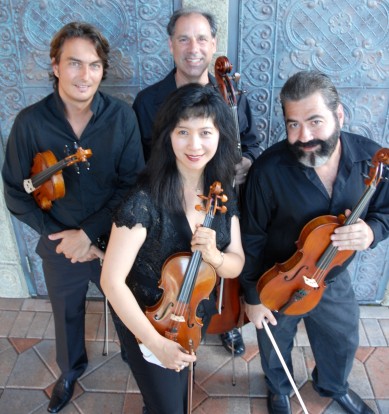Delray Quartet shows maturity and richness in Ravel and Villa-Lobos
The string quartet is among the most austere musical forms, attracting the most serious-minded composers and the most mature, intellectual audiences. It is classical music’s classical music.
Yet as the Delray String Quartet showed Saturday night, string quartets can be as sensual and deeply colored as any tone poem, producing sounds as pleasurable as a Tchaikovsky ballet suite. In works of Villa-Lobos, Schubert and Ravel, the quartet explored a range of colors and sounds much wider than typically heard in the masterworks of Beethoven, Brahms or Shostakovich.
The program was the second of this season, as the quartet pursues its ambition to move beyond Delray Beach and became a regional institution. The concert at Fort Lauderdale’s All Saints Episcopal Church attracted 120 people, a good showing for its second venture into the city. It will be repeated today in Delray Beach and Friday in Coral Gables.
In past performances, the quartet has sometimes played with too much intensity, pouring more bow-scraping energy into works than they could handle. But this was not the case Saturday, and it was avoided, especially, in Ravel’s String Quartet in F Major, in which the shimmering surfaces were not disturbed by any sign of effort, despite the work’s demands on the players’ techniques.
If the word orchestrated can be applied to any quartet, it can be applied here, as Ravel creates so many textures from the seemingly limited combination of four stringed instruments. The high points were many: the gorgeous tones of first violinist Mei Mei Luo and violist Richard Fleischman as they played a melody octaves apart in the first movement over repeated figures in the second violin and cello; the orchestral textures of the second movement, as the musicians played tremolo figures; the fast-running passages in the viola under a sultry melody in the violins.
The Brazilian composer Heitor Villa-Lobos wrote 17 quartets, from very formal European-style works to freer, folk-inspired compositions. His String Quartet No. 5 relies heavily on folk songs and children’s songs. In a pre-concert talk—an informal and entertaining 15 minutes or so that is well worth attending—the quartet’s cellist Claudio Jaffé, who is from Brazil, mentioned that his father had known and worked with Villa-Lobos. And as most of the audience were probably unfamiliar with the work, he told them not to worry about attempting to discover sonata form or anything else like that in the work — the composer was just stringing together melodies in a pleasant, happy work and everyone should just relax and enjoy it.
Villa-Lobos, who had played the cello, showed a love for the cello in his compositions, including not only two concertos but other works that highlight that instrument. In this quartet, he gave the cello some of his most striking melodies and motifs, and Jaffé handled them with sensitive phrasing and a singing tone.
In the quartet’s exploration of the tonal possibilities of the four instruments, this work made an unusual technical demand—the use of artificial harmonics, a technique usually restricted to solo virtuoso works for string instruments, but carried out Saturday with accuracy and polish.
The quartet opened with Schubert’s youthful, two-movement Overture for String Quartet in C Minor, playing the opening Largo with symphonic richness and the ensuing Allegro with fiery, astringent intensity. As an encore, the Delray members offered a spirited account of Shostakovich’s Allegretto (Polka), a work of slapstick harmonies and lopsided melodies that made a worthy end to the evening.
The Delray String Quartet repeats the program 4 p.m. today at The Colony Hotel and Cabana Club, Delray Beach, and 7:30 p.m. Friday at St. Thomas Episcopal Parish, Coral Gables. Call 561-213-4138 or go to www.delraystringquartet.com.
Posted in Performances
Leave a Comment
Sun Jan 3, 2010
at 11:07 am
No Comments
